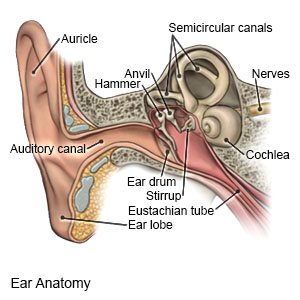Ear Infection
Medically reviewed by Drugs.com. Last updated on Mar 10, 2025.
What do I need to know about an ear infection?
An ear infection is also called otitis media. Blocked or swollen eustachian tubes can cause an infection. Eustachian tubes connect the middle ear to the back of the nose and throat. They drain fluid from the middle ear. You may have a buildup of fluid in your ear. Germs build up in the fluid and infection develops.
 |
What are the signs and symptoms of an ear infection?
- Ear pain
- Fever or a headache
- Trouble hearing
- Ringing or buzzing in your ear
- Plugged ear or an ear that feels full
- Dizziness
- Nausea or vomiting
How is an ear infection diagnosed?
Your healthcare provider will examine your ears, head, neck, and mouth. He or she will also ask you to describe your symptoms. You may also need the following:
- Audiometry is a test used to check for hearing loss. Sounds are played at different volumes to check how much you can hear.
- Tympanometry is a test used to check pressure changes in your inner ear.
How is an ear infection treated?
- Acetaminophen decreases pain and fever. It is available without a doctor's order. Ask how much to take and how often to take it. Follow directions. Read the labels of all other medicines you are using to see if they also contain acetaminophen, or ask your doctor or pharmacist. Acetaminophen can cause liver damage if not taken correctly.
- NSAIDs , such as ibuprofen, help decrease swelling, pain, and fever. This medicine is available with or without a doctor's order. NSAIDs can cause stomach bleeding or kidney problems in certain people. If you take blood thinner medicine, always ask your healthcare provider if NSAIDs are safe for you. Always read the medicine label and follow directions.
- Ear drops may contain medicine to decrease pain and inflammation.
- Antibiotics help treat a bacterial infection.
Drugs used to treat this and similar conditions
Cortisporin-TC
Cortisporin-TC is used for acute otitis externa, chronic otitis media, middle ear infections ...
Coly-Mycin S
Coly-Mycin S is used for acute otitis externa, chronic otitis media, middle ear infections, otitis ...
Colistin sulfate/hydrocortisone/neomycin/thonzonium bromide otic
Colistin sulfate/hydrocortisone/neomycin/thonzonium bromide otic is used for acute otitis externa ...
How can I manage my symptoms?
- Apply heat on your ear for 15 to 20 minutes, 3 to 4 times a day or as directed. You can apply heat with an electric heating pad, hot water bottle, or warm compress. Always put a cloth between your skin and the heat pack to prevent burns. Heat helps decrease pain.
- Apply ice on your ear for 15 to 20 minutes, 3 to 4 times a day for 2 days or as directed. Use an ice pack, or put crushed ice in a plastic bag. Cover it with a towel before you apply it to your ear. Ice decreases swelling and pain.
How can I help prevent an ear infection?
- Wash your hands often to help prevent the spread of germs. Ask everyone in your house to wash their hands with soap and water. Ask them to wash after they use the bathroom or change a diaper. Remind them to wash before they prepare or eat food.

- Stay away from people who are ill. Some germs spread easily and quickly through contact.
When should I seek immediate care?
- You have clear fluid coming from your ear.
- You have a stiff neck, headache, and a fever.
When should I call my doctor?
- You see blood or pus draining from your ear.
- Your ear pain gets worse or does not go away, even after treatment.
- The outside of your ear is red or swollen.
- You are vomiting or have diarrhea.
- You have questions or concerns about your condition or care.
Care Agreement
You have the right to help plan your care. Learn about your health condition and how it may be treated. Discuss treatment options with your healthcare providers to decide what care you want to receive. You always have the right to refuse treatment. The above information is an educational aid only. It is not intended as medical advice for individual conditions or treatments. Talk to your doctor, nurse or pharmacist before following any medical regimen to see if it is safe and effective for you.© Copyright Merative 2025 Information is for End User's use only and may not be sold, redistributed or otherwise used for commercial purposes.
Learn more about Ear Infection
- Antibiotics 101: Common Names, Types & Their Uses
- Can You Drink Alcohol with Antibiotics?
- Middle Ear Infection FAQs (Acute Otitis Media)
Treatment options
- Medications for Chronic Otitis Media
- Medications for Infection
- Medications for Otitis Media with Perforation of Ear Drum
Care guides
- Barotitis Media
- Ear Infection in Children
- Eustachian Tube Dysfunction
- Fluid in the Ear (Serous Otitis Media)
Symptoms and treatments
Further information
Always consult your healthcare provider to ensure the information displayed on this page applies to your personal circumstances.
